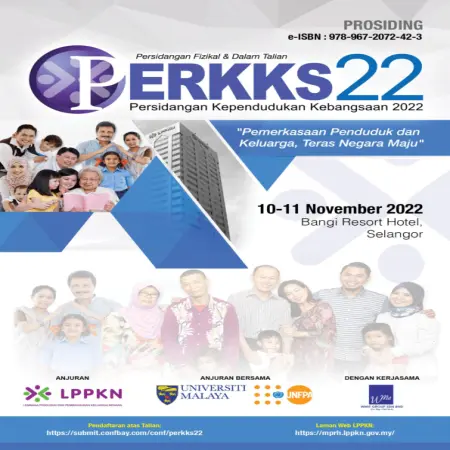| Additional Information |
This paper has been presented at the National Population Conference 2022 (PERKKS 22) – Bangi Resort Hotel, Selangor on 10-11 November 2022. It is jointly organized by the National Population and Family Development Board (LPPKN), United Nations Population Fund (UNFPA) Malaysia, Faculty of Business and Economics, Universiti Malaya (UM) in collaboration with WMIT Group Sdn Bhd.
For further information, please contact:
1. Noor Azimah Muhammad
Department of Family Medicine Faculty of Medicine
Universiti Kebangsaan Malaysia, 56000 Kuala Lumpur, Malaysia
Email: drazimah@ppukm.ukm.edu.my
2. Teh Rohaila Jamil
Department of Family Medicine Faculty of Medicine
Universiti Kebangsaan Malaysia, 56000 Kuala Lumpur, Malaysia
Email: tehrohaila@ppukm.ukm.edu.my
3. Farah Umairah Sallehudin
Department of Family Medicine Faculty of Medicine
Universiti Kebangsaan Malaysia, 56000 Kuala Lumpur, Malaysia
Email: farah.usalleh@gmail.com
4. Mohd Al Adib Samuri
Institut Islam Hadhari
Universiti Kebangsaan Malaysia, 43600 Selangor, Malaysia
Email: al_adib@ukm.edu.my
5. Rosnah Sutan
Department of Community Health Faculty of Medicine
Universiti Kebangsaan Malaysia, 56000 Kuala Lumpur, Malaysia
Email: rosnah.sutan@ppukm.ukm.edu.my
6. Khansa’ Abd Halim
National Population and Family Development Board Wilayah Persekutuan
50350 Kuala Lumpur, Malaysia
Email: khansa@lppkn.gov.my
7. Wan Nur Baiti Sudin
National Population and Family Development Board Wilayah Persekutuan
50350 Kuala Lumpur, Malaysia
Email: wnbaiti@gmail.com |
| Abstract |
As parents generally have more contact than other adults with their children, they are the most suitable people in imparting correct knowledge about sexual and reproductive health (SRH) to their adolescents. However, apart from getting information from parents, adolescents also learn from other parties such as the internet, teachers, or peers. Thus, this study aimed to explore mothers’ views on parent-adolescent communication on SRH and their expected roles in communicating about SRH. |





